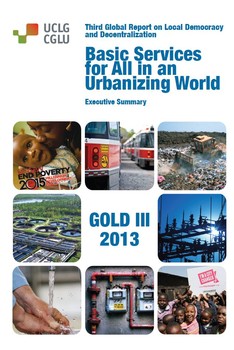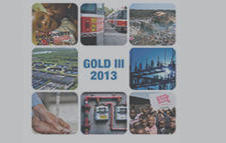
GOLD III report highlights the critical role of sub-national governments in basic service provision and the post-2015 development agenda
Basic Services for All in an Urbanizing World is UCLG’s third Global Report on Local Democracy and Decentralization (GOLD III). The three year study by UCLG highlights the urgent need to provide basic services the planet’s cities, whose population is set to grow by one and a half billion people over the next 15 years. The full report was published on June 17th 2014.
GOLD III highlights the critical role of basic services (water, sanitation, energy, transportation and solid waste management) in poverty reduction, economic development, and climate change adaptation.
The report finds that the responsibility for the provision of basic services often falls to local and regional governments, and that “improvements to basic services are positively correlated with local government involvement in their provision.”
The report criticizes the Millennium Development Goal targets for assessing who has ‘improved’ water and sanitation by applying the same definitions to vastly different rural and urban contexts. It also points out that the monitoring of the MDGs at national level hides significant variation in their achievement within countries. GOLD III calls for a seat to be given to sub-national governments at the international negotiating table and for the ‘localization’ of all targets and indicators in the post-2015 sustainable development agenda.
GOLD III is already having a significant political impact through the international advocacy work of local and regional governments.
The report’s findings on the importance of appropriate basic service infrastructure in cities are being used to support UCLG’s campaign for a stand-alone urban sustainable development goal (#UrbanSDG).
UCLG is also using GOLD III to advocate for the localization of all targets and indicators in the post-2015 agenda in order to take account of rural and urban contexts, as well as other sub-national variations in the implementation and monitoring of international development goals. The UN Development Group (UNDG) has invited the Global Task Force of Local and Regional Governments to officially co-lead consultations on the localization of the post-2015 agenda. This is a step forward in the recognition of sub-national governments in UN development negotiations.
- A draft Executive Summary of the report is available for download.
- Full recommendations of the report.
- Full report was published on June 17th 2014. Pre-order available.
- For more information, please visit GOLD III website











